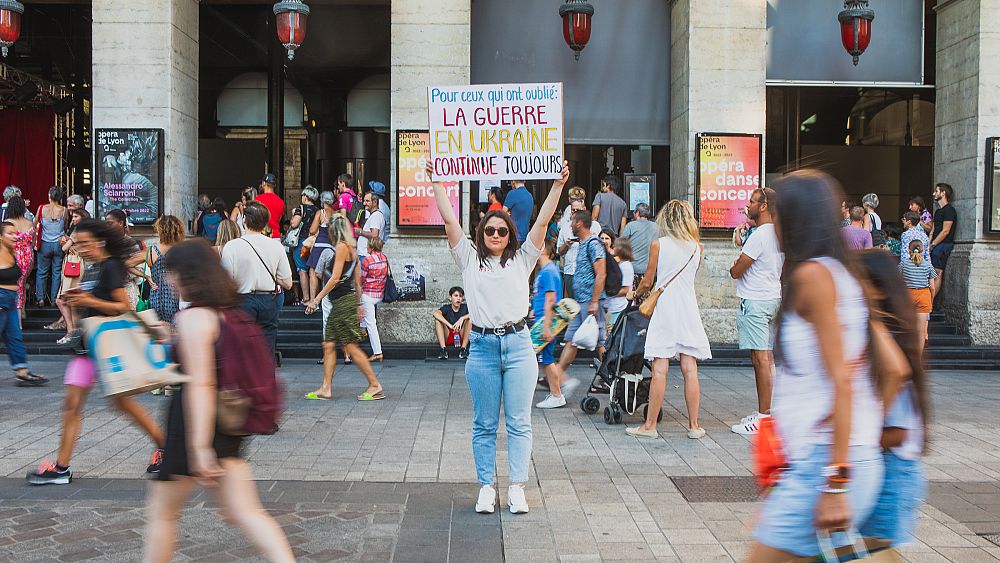It’s one of those ordinary evenings in the middle of the week, a group of young women is sitting at a round table in a big apartment in central Lyon.
It’s not their home, everything in France is a new start.
They are living in temporary accommodation provided by local people free of charge, trying to learn French and find work. Their free time and all their thoughts go to the country where they were born – Ukraine.
With fatigue of the news about the war increasing in the west, their aim is to keep the public’s attention on the current events in their home country. This cause is something that keeps them going.
Tonight the atmosphere is calm and amicable, yet it feels as if every discussion touches an exposed nerve. Despite all the help that the French state and some local people provide to these refugees, they do not feel fully understood. They do not believe that the war that has destroyed or endangered their homes, threatens their loved ones daily and has left nothing of what their life looked like before, is taken seriously enough here.
They feel the war is increasingly forgotten, seen as a norm or somebody else’s business. For them, it remains an open wound hurting around the clock.
‘Let’s make a list of the arguments, why this touches the French people too,’ somebody suggests during the brainstorming about the posters to be created next. ‘Predicted food crisis? Fuel prices? Russia would not stop in Ukraine if it wins?…
‘Ok, let’s say we have managed to reach out to these people. How can they help?’
‘Put pressure on their governments! Ask to call Russia a terrorist state! Donate! They do not want to donate to our army, as they feel it is supporting the military action. But these are people like us dying, it’s all the same. Then there are humanitarian causes for civilians…’ says Diana Dimitrova. ‘
We need help, we need people to donate to Ukraine. Otherwise, this ‘Russian world’ could come to any place. We shouldn’t underestimate Russia, what they are doing is impacting everybody. Look at the prices, for example, don’t forget they have nuclear arms. Ukraine is fighting not only for its freedom but for the freedom of others too,’ she adds.
Liliya from Dnipro, arrived in France after the beginning of the war. She went to a similar gathering on Sunday afternoon. She says it’s important for her to make her contribution to spreading the information about the war in Ukraine. She thinks if the world helps her country it’s going to help the whole world. Besides, Liliya finds the atmosphere of support among activists very helpful and important for her, as well as the cause to help the Ukrainian army through the charity events they organise. ‘We all need to show Russia its place,’ she adds.
With the freshly-made posters, in a couple of days, the group heads out to the city to draw attention to their cause. They say it’s a flashmob – people with reminders of the ongoing conflict on posters pop up in the tourist centre of the city among the seemingly carefree crowds – it’s a reflection of the reality, protesters think.
Mila, a TV presenter from Ukraine’s capital Kyiv, has not a stone left behind in her home town Mariupol, where her family members, now refugees, used to live. She holds a sign that reads in French ‘the only difference between you and a refugee is luck’.
The group is now preparing an event to mark the 6th month anniversary of Russia’s full-scale invasion of Ukraine and the 31st anniversary of the country’s independence.
At 18.00 on August 24, they will walk with the posters and an 8-meter long Ukrainian flag from place Terreaux in the very centre of Lyon. The march will end on another big square – place Bellecour – in the second district of Lyon, where the organisers plan to invite the crowd to recreate the outline of Ukraine with its sovereign borders.
The Ukrainians hope not to walk alone on the day, that the French people will join them too, representing associations or simply demonstrating their own position in this time in history.

















.png)


Discussion about this post